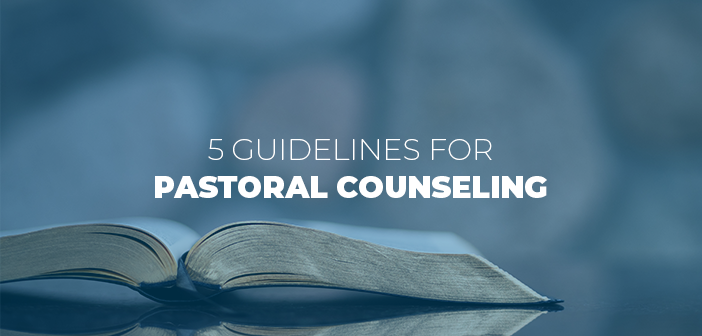The following 5 principles come out of my experience in leading a small church. I found that my time was better stewarded as I implemented them into my weekly rhythm. My prayer is that they will help you gain some much needed time in your week for preparing and planning.
Is Counseling Distracting Your Leadership?
It goes without saying that the small-church pastor has a lot of expectations placed on them. The majority of us embrace these expectations with a sense of Divine responsibility. After all, there are so many elements of leading small churches that simply will not get done if we don’t do them.
I think this is a contributing factor to why we often put such leadership priorities as vision casting and structuring for healthy growth on the back burner. There always seems to be a more pressing situation that comes up. The urgency of a current crisis trumps the perfectly planned schedule that we had created to set aside time for dreaming and planning. Before you know it, several months have gone by and you have transitioned from one season to the next without setting a proper course of action for your church.
An honest assessment of how most small churches determine their action plan can best be described as reactive instead of proactive. Please don’t interpret this assessment as being critical. The last thing I want to do is to criticize a pastor who is honestly doing their best to minister to their flock. I applaud every one of you who are working hard in an effort to faithfully serve those in your charge. I believe Jesus applauds you too!
The solution I want to offer you comes from a quote by John Maxwell that I heard thirty years ago: “It’s time to work smarter. Not harder!” I have already acknowledged the fact that many things in our churches will not get done unless we do them. However, I would like to offer some wisdom that could possibly lighten your load a little. Maybe it’s time to hand off some of the counseling load that you bear.
Anyone who has served in the local church for a while knows the impact that counseling has on your schedule. I am not referring specifically to the planned counseling sessions that you have scheduled as much as the unplanned sessions that happen every week. Truthfully, many in our congregations would not equate the time they casually stop by to unload their current issues on us as a counseling appointment. However, you and I both know that is exactly what happens. And because we care so much for them, we determine to somehow catch up on the time that was lost in that one-hour “just checking in” interruption. Yet we seldom do!
Counseling Guidelines For Small Church Pastors
Principle #1 – Block out certain hours on your weekly schedule that you allot for counseling.
This assumes that you have a written calendar that you live by each week. If you don’t, it’s time to start! Schedule blocks of time for study, staff/volunteer leadership, service planning, counseling, etc. I personally like to schedule counseling on days away from service prep and study. If you don’t run your schedule, your schedule will end up ruining you!
You will still have occasional unplanned interruptions. However, a written calendar plan allows you to communicate to the congregation that you have intentionally made time to help them when they need your wisdom.
Principle #2 – Don’t do marriage counseling without both parties present.
I have found that it doesn’t accomplish anything positive to allow someone to share issues about their spouse without having them present to share the other side of the story. (Exceptions would be in the case of domestic abuse, something endangering a life, or actions that are illegal.) One-sided counseling is usually a big time waster.
Principle #3 – Never personally counsel anyone more than three times on the same issue.
It has been my experience that I am ineffective after three sessions for a few reasons:
- The person just wants me to listen to their problems but has no intention of changing. Talking about the problem without wanting to resolve it is a waste of your time.
- The person isn’t following through with the counsel from our previous sessions. I always give the person(s) being counseled homework assignments to do before our next session. I will not see them again if they don’t do the work.
- The person has an issue of which I am not qualified to deal with effectively. In other words, their problem is over my head! This leads to our next principle.
Principle #4 – If possible, develop a relationship with a certified Christian counselor within the geographical area of the church.
I recommend that local church pastors only deal with “minor” issues and hand off all “major” counseling issues to a certified Christian counselor, if possible. This is good for the person being counseled as well as for you. Intense counseling requires a great deal of time and constant oversight. Heavy cases are best handled by the professionals. There are even legal and liability issues that arise in some instances of intense counseling.
Your church may even want to provide financial assistance in covering the costs of seeing a professional counselor as an aspect of your missions giving. This allows you to support those who’ve chosen this field in the Christian arena to be sustainable. If there is not a certified counselor in your area, it may be possible to connect with some ministries online that can assist them.
Principle #5 – Intentionally examine your heart’s motive during counseling.
This is a difficult but necessary topic to bring up. However, as a fellow pastor, I think we need to go here. The Bible says in Proverbs 4:23, “Above all else, guard your heart, for everything you do flows from it.” (NIV)
It is a very powerful thing for people to come to us for spiritual advice and counsel. In so many cases, people still put a pastor on a pedestal. For me personally, nothing in leading people can be more encouraging than being able to help someone solve their problems. Every pastor knows the unexplainable feeling that happens when you sense that the Holy Spirit is speaking through you. However, if we aren’t careful, that feeling of helping people can become quite intoxicating.
1 John 2:16 says, “Practically everything that goes on in the world – wanting your own way, wanting everything for yourself, wanting to appear important – has nothing to do with the Father. It just isolates you from him.” (MSG)
There is a certain power that comes with speaking into people’s lives. This power left unchecked has resulted in the fall of many pastors over the years. My heart’s desire is to keep you from falling! So please do as I did and check your heart when counseling others. Identify any impurities and eliminate them. Don’t allow yourself to slide into a secret place in your mind of isolation.
Proverbs 18:1 says, “A man who isolates himself seeks his own desire; He rages against all wise judgment.” (NKJV)
It is vital to never allow yourself to over-schedule counseling week after week at the detriment of other leadership responsibilities. If you find yourself doing this on a continual basis, you may want to do some “soul searching” for any impure motive or ego-boosting fulfillment. Jesus needs to be our main source of purpose as we serve His church!
It can truly be overwhelming trying to lead a small church. It is vitally important to your overall health as well as your congregation’s that you carve out the necessary time to provide direction through your mission and vision. Reducing your counseling load may be just the thing you need to create margin for more effective leadership.
These principles were beneficial for me. I believe they will work for you as well!







